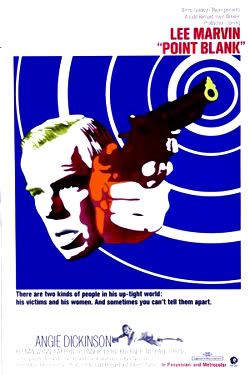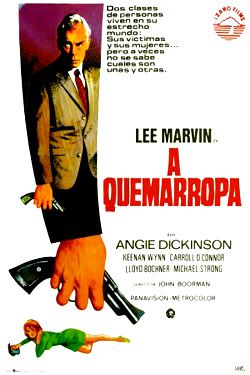← Back to Reviews
in
Now I might be looking too deep into things but I actually wonder if Walker is supposed to be dead at the film's opening at Alcatraz, or at the very least dying, and the film is all just in his imagination. Much of that is down to the film's disjointed, dreamlike quality. And the way it is filmed just creates a contrasting feeling of both real and unreal. And there is the way that Walker attains a somewhat mythic standing as if it is all part of his wish fufillment. Very early on there is a moment where Boorman cuts from a shot of Walker swimming from Alcatraz to a shot of him on a tour ferry overlooking that same island, all the while with a woman narrating in the background about how it was impossible to escape across the wild currents. And yet here Walker stands.
I just love the style of the film. From its fashion to the interior décor of its settings it could not be more 60s if it tried. With it's bold colours it's hard to believe this film was released in the same year as In The Heat of the Night. They look like they exist in completely different worlds and eras. And the way Boorman shots it creates such an atmosphere of seediness and desperation, striking cinematography transforming LA into a depraved and hellish land were Marvin's Walker fits perfectly.

|

|
Year of release
1967
1967
Directed by
John Boorman
John Boorman
Written by
Rafe Newhouse (script)
David Newhouse (script)
Alexander Jacobs (script)
Donald E. Westlake (story)
Rafe Newhouse (script)
David Newhouse (script)
Alexander Jacobs (script)
Donald E. Westlake (story)
Starring
Lee Marvin
Angie Dickinson
John Vernon
Keenan Wynn
Lee Marvin
Angie Dickinson
John Vernon
Keenan Wynn
Point Blank
-
Plot – While taking part in the theft of cash that is used as part of a gambling operation Walker (Marvin) is double crossed and left for dead by his friend Reese (Vernon) on Alcatraz island who also makes off with Walker's wife. After recovering, Walker becomes like a machine fuelled by revenge, single-minded in his aims to recover the $93,000 he is owed. His former friend Reese used that money to buy his way into The Organisation so Walker has more to contend with than he perhaps anticipated. However as he begins leaving a trail of bodies on his way to the top of the organisation they too realise they're dealing with something more than they bargained for.
Huh. Turns out that Dirty Harry wasn't the first appearance of Harry Callahan, it was in Point Blank 4 years previous. Ok so it's not actually Harry Callahan here but it sure feels a lot like it, right down to the character's San Francisco setting. Lee Marvin imbues Walker with the kind of stony faced look and dead eye glare that would become an Eastwood hallmark, creating a classic amoral anti-hero. And it's not just the performance of the actors that feel familiar but the manner of the character. Marvin's Walker is an imposing angel of death (though he personally never kills anyone, they just have a habit of dying when he's around) who is ready to take on an entire crime organisation to get back the money that he is owed. He is a relentless, monosyllabic presence with just one thing on his mind and no-one will be able to stop him. He seeks retribution seemingly according to a code of conduct he follows, feeling very much like a man out for justice in the Old West. A real tragic hero. About the only difference is that Harry Callahan had a badge.
I just absolutely loved the editing of this film, constant quick cuts which throw us forward and back in time and echoing dialogue which bleeds over into other scenes. It left me feeling a touch disorientated at times but it was quite thrilling. Of particular note is the movie's opening stretch at Alcatraz prison which features flashbacks within flashbacks and acted as a quite baffling introduction which throws us right into the deep end of how this film aims to continue. It's often bewildering, but undeniably stylish.
Film trivia - It wasn't just on screen that Marvin was an imposing badass. While rehearsing scenes at his home Marvin once hit John Vernon so hard that Vernon actually cried.
I just love the style of the film. From its fashion to the interior décor of its settings it could not be more 60s if it tried. With it's bold colours it's hard to believe this film was released in the same year as In The Heat of the Night. They look like they exist in completely different worlds and eras. And the way Boorman shots it creates such an atmosphere of seediness and desperation, striking cinematography transforming LA into a depraved and hellish land were Marvin's Walker fits perfectly.
Despite it's incredibly 60s vibe the film also feels quite fresh in some ways. In a number of ways it feels like a forebearer to the kind of films that started emerging in the 90s from the likes of Quentin Tarantino. It's a visceral, hard nosed and often brutal revenge flick which mixes blacker than black comedy and explosive action and emerges as something approaching mythical. Director John Boorman seems to have made an exercise is showing off, a neo-noir that swaggers with style and violence.
Film trivia - The film was remade as 1999's Payback, with Mel Gibson taking over the Lee Marvin role.
All of the style aside it's actually an extremely straightforward tale of revenge; a standard thriller which is just told in a terrifically artistic kind of way. Indeed with its fractured structure, flashbacks and time lapses I believe the film quite often mirrors the style of the French New Wave, though I haven't really seen any of the films to be definite on that point. The premise is straightforward as is the film's structure. If anything it resembles the kind of 'plot' you may find in a computer game were you are given an objective to complete and then you battle a 'big boss' at the end of the level. Walker goes from one person to the next, leaving them trailing in his wake after gathering information from them that sets him on his way to the next person. All of them just acting as rungs on a ladder for Walker until he gets what he wants. This produces some great scenes, in particular Walker's fight with two goons backstage in a nightclub and the moment where Walker deliberately crashes a car over and over again just to try and intimidate his passenger.
Conclusion – A slick, suspenseful film that is lit up by Boorman's visual artistry and moments of terrifically stylized violence. Like a standard American thriller told with a European sensibility. And Marvin delivers a truly intimidating badass
